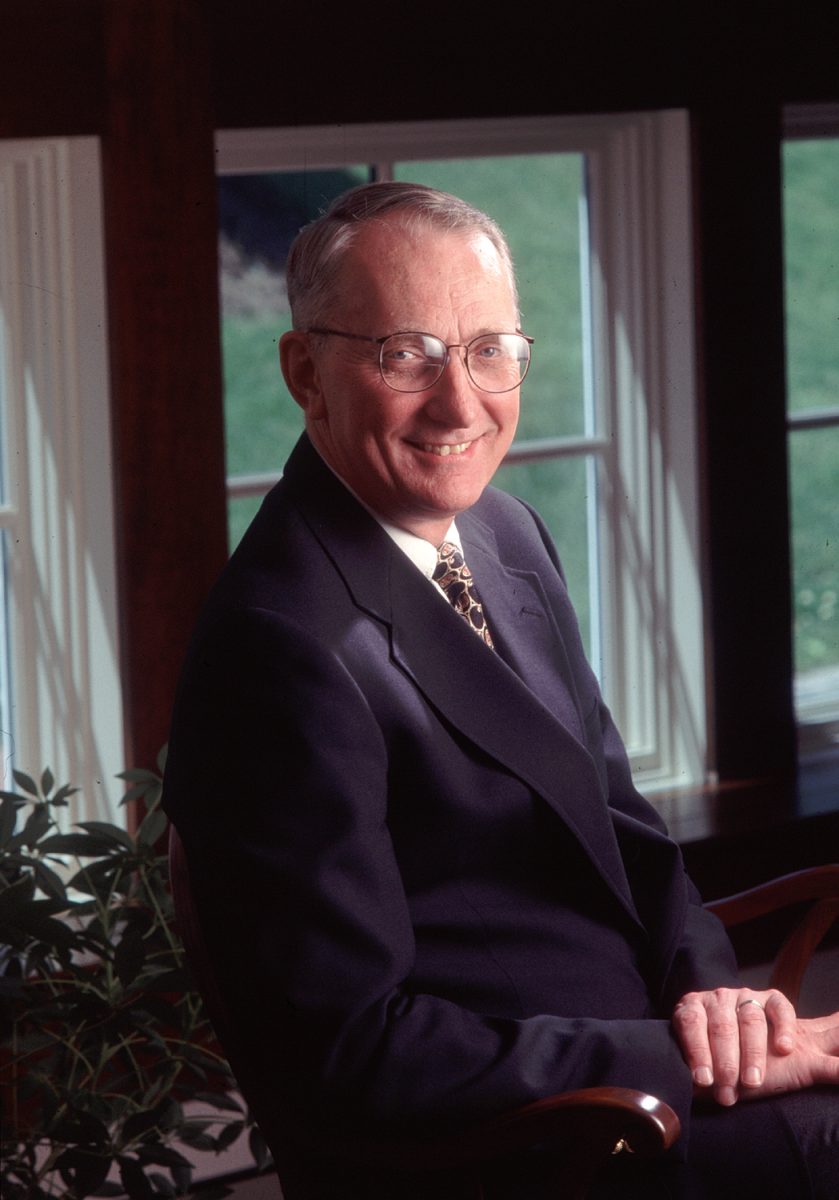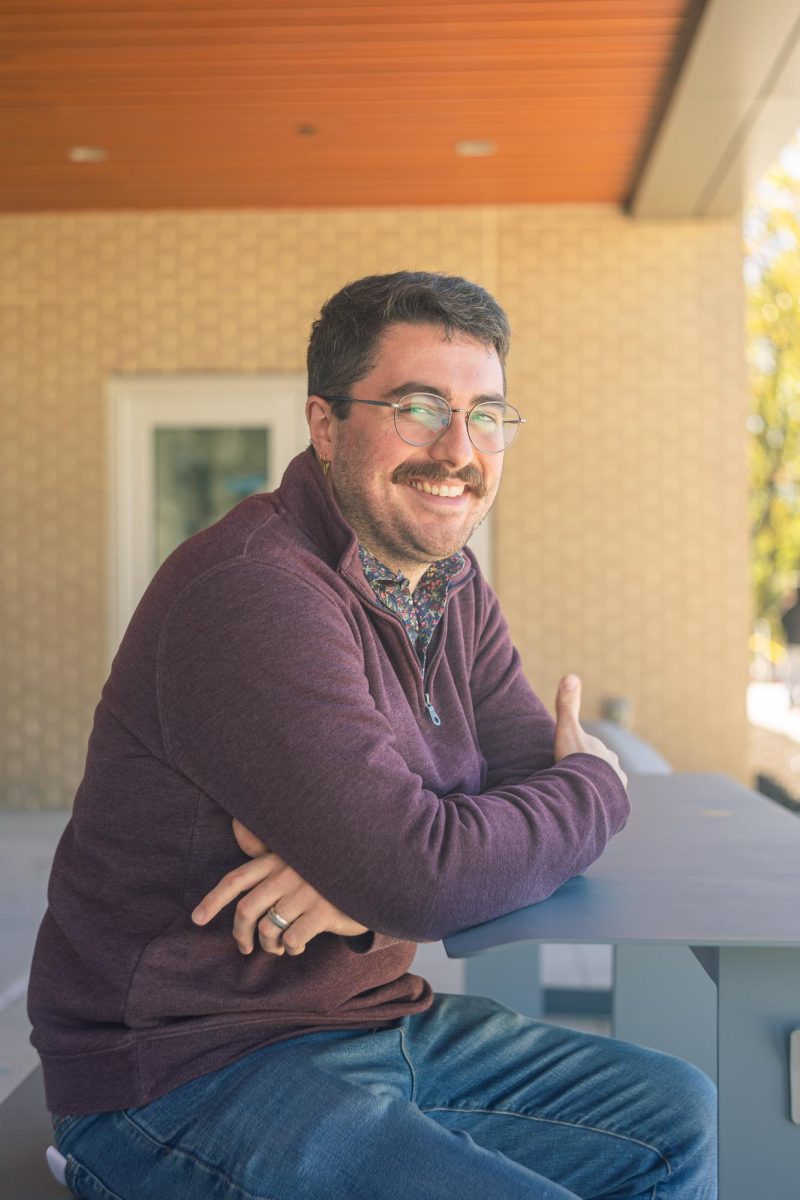An unlikely candidate for Moravian College president, Dr. Ervin J. Rokke left a lasting impression on the campus students, faculty, staff, and programs that persists to this day.
A retired four-star general in the U.S. Air Force and dean of faculty at the Air Force Academy, he defied expectations by becoming Moravian’s 15th president, filling the position from 1997 to 2006.
He was a somewhat controversial choice for a college founded by pacifist Moravians, but he embodies the qualities of Moravian during a tenure rooted in respect, collaboration, and ambition.
“When I first learned that Moravian had hired an Air Force General as our next president, I worried that he might not understand or value the arts,” said Paula Zerkle, music department chair and director of vocal music. “I could not have been more mistaken.”
Standing at 6’6″, Rokke was endearingly known as a “gentle giant” who carried himself with poise and warmth. Any worries about a strict military veteran leading the university quickly faded.
“You could strongly disagree with him and still walk away with mutual respect,” said Carol Traupman-Carr, Vice President for Institutional Effectiveness and Dean for Academic Operations. “It never felt like a military regime here.”
Colleagues remember Rokke as approachable and thoughtful, a president who began phone calls with “hello, friend,” and took personal interest in the success of those he worked with, both personally and professionally.
“When my husband and I faced the heartbreak of a disrupted adoption, Erv and his wife, Pam, welcomed us with open hearts,” Zerkle remembered. “They took us under their wing and offered the comfort and refuge of their cabin in the Poconos, where we began to find healing from that loss.”
Rokke was a passionate music lover, especially of jazz. He and his wife, Pam, regularly attended student concerts.
“We had record music major enrollment and our ensembles teemed with students,” said Neil Wetzel, professor of music and director of jazz studies.
Traupman-Carr explained that the Rokkes loved living in the President’s house on South campus because they were so close to the music department.
When the jazz department was at risk of losing Wetzel as its part-time director, Rokke personally saw that the position became full-time, which has helped the ensemble flourish to this day. Hearst Hall’s piano is dedicated to Rokke, which serves as a testament to his dedication to the department.
“I am grateful for having been given the opportunity to apply for and ultimately fill a tenure-track position as Director of Jazz Studies,” Wetzel said. “Ultimately, the jazz program at Moravian has thrived, grown, and the level of excellence has improved greatly.”
Rokke’s steady leadership was most noticed during the crisis of Sept.11, 2001, while he was in Washington, D.C. He quickly returned to Bethlehem and calmly guided the campus through those uncertain days. His Air Force training shone through, and he chose to keep classes in session to offer students a sense of purpose and keep minds occupied amid the chaos.
During his tenure, Rokke guided Moravian through pivotal changes. He launched the university’s second strategic plan in 2003, with the bold goal of elevating the school into the top ranks of the U.S. News and World Report’s national liberal arts colleges.
He believed in the mantra “we are as good as we think we are.” Under his leadership, class sizes shrank, faculty-student ratios improved, and Fulbright awards increased. He encouraged academic innovation, creating the LinC curriculum that current sophomores, juniors, and seniors are still enrolled in.
Rokke also invested in programs that have continued to shape the core values and identity of Moravian’s campus. He established SOAR, a program that provides students a stipend to conduct research and a supporting endowment to advance undergraduate research, especially in STEM fields. He also advocated for the return of the school’s nursing program.
He backed key capital projects, with the Priscilla Payne Hurd Academic Complex (PPHAC) built and opened in 2002 under his leadership. Rokke also approved the plans for the Hurd Integrated Living and Learning (H.I.L.L.) building, which began construction shortly after he left Moravian.
Rokke’s lasting legacy continues to impact the campus community today, even in subtle ways. The programs he instituted, along with the support he offered to faculty and staff, helped Moravian grow into the university it is today.
“For someone who so naturally commanded a room and towered above us all, he was also one of the warmest souls I have ever known,” Zerkle said. “I will miss him deeply.”









Mike Dowd • Sep 26, 2025 at 9:56 pm
As an alum and then a member of the Seminary and Joint Board I found in Erv a friend, mentor and colleague. His personal faith was the foundation upon which he built his life. His leadership at Moravian was transformational. Kathleen and I enjoyed our friendship with the Rokkes.